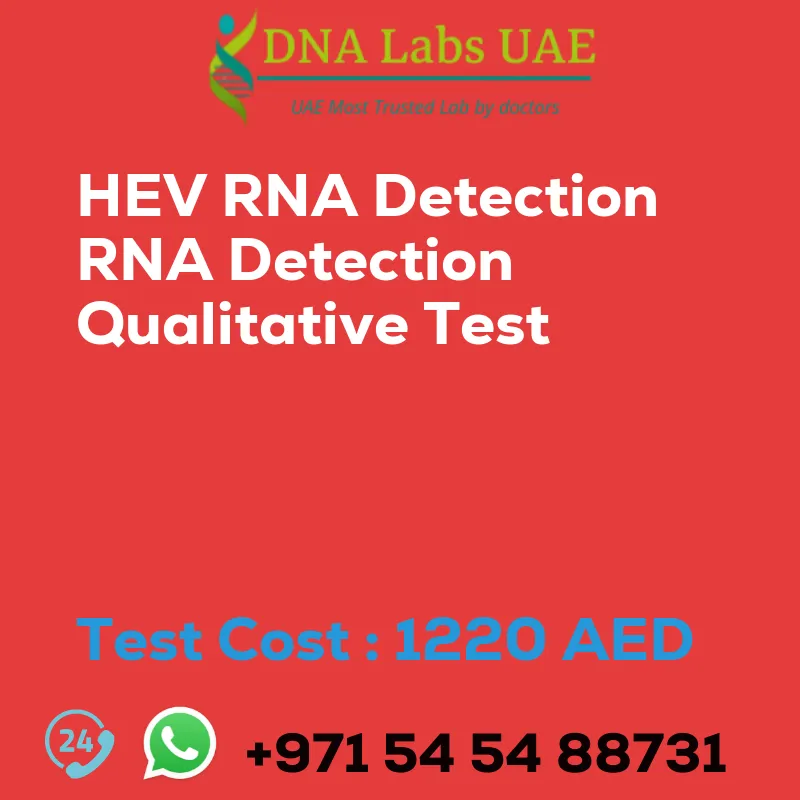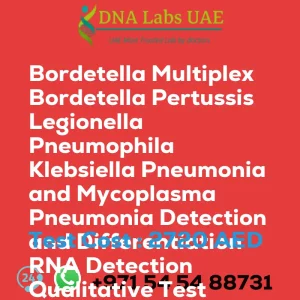HEV RNA Detection Qualitative Test
Cost: AED 1220.0
Symptoms, Diagnosis, and Test Details
HEV RNA Detection is a qualitative test used for the detection of Hepatitis E Virus (HEV) RNA in patient samples. HEV is a virus that primarily affects the liver and is transmitted through contaminated water or food. It can cause acute hepatitis, with symptoms ranging from mild to severe.
The HEV RNA Detection test utilizes a molecular method called real-time polymerase chain reaction (RT-PCR) to amplify and detect the viral RNA in the patient sample. This test is highly sensitive and specific, allowing for early detection of HEV infection.
Test Components
- Price: AED 1220.0
- Sample Condition: Whole Blood, Serum, Plasma, Stool
- Report Delivery: 3rd Working Day via Email (36 hours), On Phone (24 hours)
- Method: Real Time PCR
- Test Type: Viral
- Doctor: Physician
- Test Department: Genetics
Pre Test Information
Patients need to sign a consent document and bring any clinical history for the HEV RNA Detection Qualitative Test.
Test Procedure
- Sample Collection: A blood sample or stool sample is collected from the patient, as HEV can be detected in both blood and stool during the acute phase of infection.
- RNA Extraction: The viral RNA is extracted from the patient sample using specialized kits or methods to purify and concentrate the viral RNA for further analysis.
- Reverse Transcription: The extracted RNA is converted into complementary DNA (cDNA) using reverse transcriptase enzyme, as PCR amplification requires DNA as a template.
- PCR Amplification: The cDNA is subjected to PCR amplification using specific primers that target a region of the HEV genome, allowing for exponential amplification of the viral RNA if present in the sample.
- Detection: The amplified DNA is then detected using various methods, such as gel electrophoresis or real-time PCR. The presence of a specific DNA band or a positive signal indicates the presence of HEV RNA in the patient sample.
Significance and Benefits of HEV RNA Detection Test
The HEV RNA Detection test is typically performed in specialized laboratories and is used for diagnostic purposes to confirm HEV infection. It can also be used for monitoring the effectiveness of treatment and assessing the viral load in patients. Early detection of HEV infection is crucial for timely management and prevention of complications.
| Test Name | HEV RNA Detection RNA Detection Qualitative Test |
|---|---|
| Components | |
| Price | 1220.0 AED |
| Sample Condition | Whole Blood, Serum, Plasma, Stool |
| Report Delivery | 3rd Working Day Email:-36 hours.On phone: 24 hours |
| Method | Real Time PCR |
| Test type | Viral |
| Doctor | Physician |
| Test Department: | Genetics |
| Pre Test Information | Need to sign Consent document and bring any clinical history of patient forHEV (RNA Detection) (RNA Detection) QualitativeTest |
| Test Details |
HEV (RNA Detection) is a qualitative test used for the detection of Hepatitis E Virus (HEV) RNA in patient samples. HEV is a virus that primarily affects the liver and is transmitted through contaminated water or food. It can cause acute hepatitis, with symptoms ranging from mild to severe. The HEV (RNA Detection) test utilizes a molecular method called reverse transcription polymerase chain reaction (RT-PCR) to amplify and detect the viral RNA in the patient sample. This test is highly sensitive and specific, allowing for early detection of HEV infection. The test involves the following steps: 1. Sample collection: A blood sample or stool sample is collected from the patient, as HEV can be detected in both blood and stool during the acute phase of infection. 2. RNA extraction: The viral RNA is extracted from the patient sample using specialized kits or methods. This step aims to purify and concentrate the viral RNA for further analysis. 3. Reverse transcription: The extracted RNA is converted into complementary DNA (cDNA) using reverse transcriptase enzyme. This step is necessary as PCR amplification requires DNA as a template. 4. PCR amplification: The cDNA is then subjected to PCR amplification using specific primers that target a region of the HEV genome. This step allows for the exponential amplification of the viral RNA if present in the sample. 5. Detection: The amplified DNA is then detected using various methods, such as gel electrophoresis or real-time PCR. The presence of a specific DNA band or a positive signal indicates the presence of HEV RNA in the patient sample. The HEV (RNA Detection) test is typically performed in specialized laboratories and is used for diagnostic purposes to confirm HEV infection. It can also be used for monitoring the effectiveness of treatment and assessing the viral load in patients. Early detection of HEV infection is crucial for timely management and prevention of complications. |








